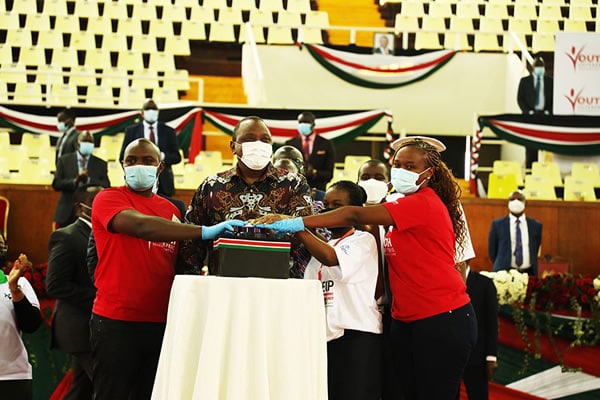President Uhuru Kenyatta with some of the winners during the award ceremony of the just-concluded MbeleNaBiz Business Plan Competition.
- Of the total MbeleNaBiz package, Kshs. 900 million will go to 250 winners as grants, with each youth entrepreneur receiving an award of Kshs. 3.6 million.
- The balance of Kshs. 450 million will be given as grants to the other 500 winners and each winner will get a total of Kshs. 900,000 to develop their innovations and ideas.

MbeleNaBiz is an initiative jumpstarted by the Government of Kenya through kyeop funded by the world bank and KPMG. Its main intent was to empower the youth to be their own bosses by providing grants of Ksh. 3.6m or 900k. The applicants were invited to write their business plans in order to defend their business ideas.
The total applicants at Stage 1 were 12000+, in stage two 4700 applicants were shortlisted. in stage 3 1700 applicants were shortlisted after which further pitches and surveys were conducted. Finally 750 applicants were selected as winners.
The MbeleNaBiz Business Plan Competition which was organized by the Ministry of ICT Innovation and Youth Affairs under the Kenya Youth Enterprise and Opportunities Project will award the 750 youth KShs 1.3B as grants to help them run their enterprises expand their solutions.
This was announced on Wednesday as the MbeleNaBiz Competition came to a close, at the handover ceremony graced by President Uhuru Kenyatta. Speaking during the awarding ceremony of winners and the launch of the 3rd cycle Strategic Plan of the Youth Enterprise Development Fund covering the period 2020-2024 in Nairobi, President Kenyatta said of the total grant, Kshs. 900 million will go to 250 winners as grants.
“Each of these 250 entrepreneurs will receive an award of Kshs. 3.6 million to develop your dreams. The balance of Kshs. 450 million will be given as grants to the other 500 winners and each winner will get a total of Kshs. 900,000 to develop their innovations and ideas,” said President Kenyatta about the MbeleNaBiz winners.
One of the winners, popularly known as Prince Charles, shared with us his winning entry:
His business plan was based on the Mshamba Digital Smart Farming device that allows farmers have accurate data on their farms.
“I am into smart farming using advanced tech as the project that won the grant, and I will be using my funds to set up a smart greenhouse with my smart farming gadget(M-Shamba Digital) installed with solar panels to ensure no power outages. This will require me to acquire a land in Ukambani (as per my MbeleNaBiz application Business Plan) as the gadget is meant to have hydroponics greenhouse that only uses 5% of water by ensuring that reusable water and nutrient absorption is not wasted,” he says.

Charles avers that his long term goal is to change the narrative in Ukambani, in Kenya’s Eastern Province, by supplying fresh farm crop produce, which has thus far been very difficult due to lack of water, which forces residents to transport vegetables over long distances reducing the shelf life of the produce.
“In more advanced models we have incorporated automated irrigation/watering system, automated lighting when light intensity falls below a set threshold as well as temperature balance. This information can also be relayed to clients smart phones via USSD/text message or dashboards,” he explained to Success Afrika.
He says the grant is a shot in the arm for his enterprise.
The government has so far disbursed Kshs. 501 million through the Youth Enterprise Development Fund (YEDF) since March 2020 to support youth-run enterprises affected by the coronavirus pandemic stay afloat. Overall, the YEDF has supported 2 million youth with loans worth Ksh.13.5 billion to date.
The National Treasury is expected to raise the revolving Fund from Ksh.4.5 billion to Ksh.5.5 billion with loan disbursements set to rise from the current Ksh.13.5 billion to Ksh.16 billion during the plan period.
President Kenyatta assured the youth that a proposed 7-year tax holiday for young entrepreneurs will help grow their businesses through capital retention that would have been paid as taxes to the Kenya Revenue Authority.
“If the 250 young entrepreneurs were to earn an average of 150,000 shillings every month from their initial grant of Kshs. 3.6 million, they would collectively make Kshs. 37.5 million a month in profit. And this translates to an average of about Kshs. 450 million per year or Kshs. 3.15 billion in seven years. If the taxman took his cut from these earnings, the 250 grantees we are empowering today would “forego” close to one Kshs . 1 billion to tax in seven years,” he noted.

